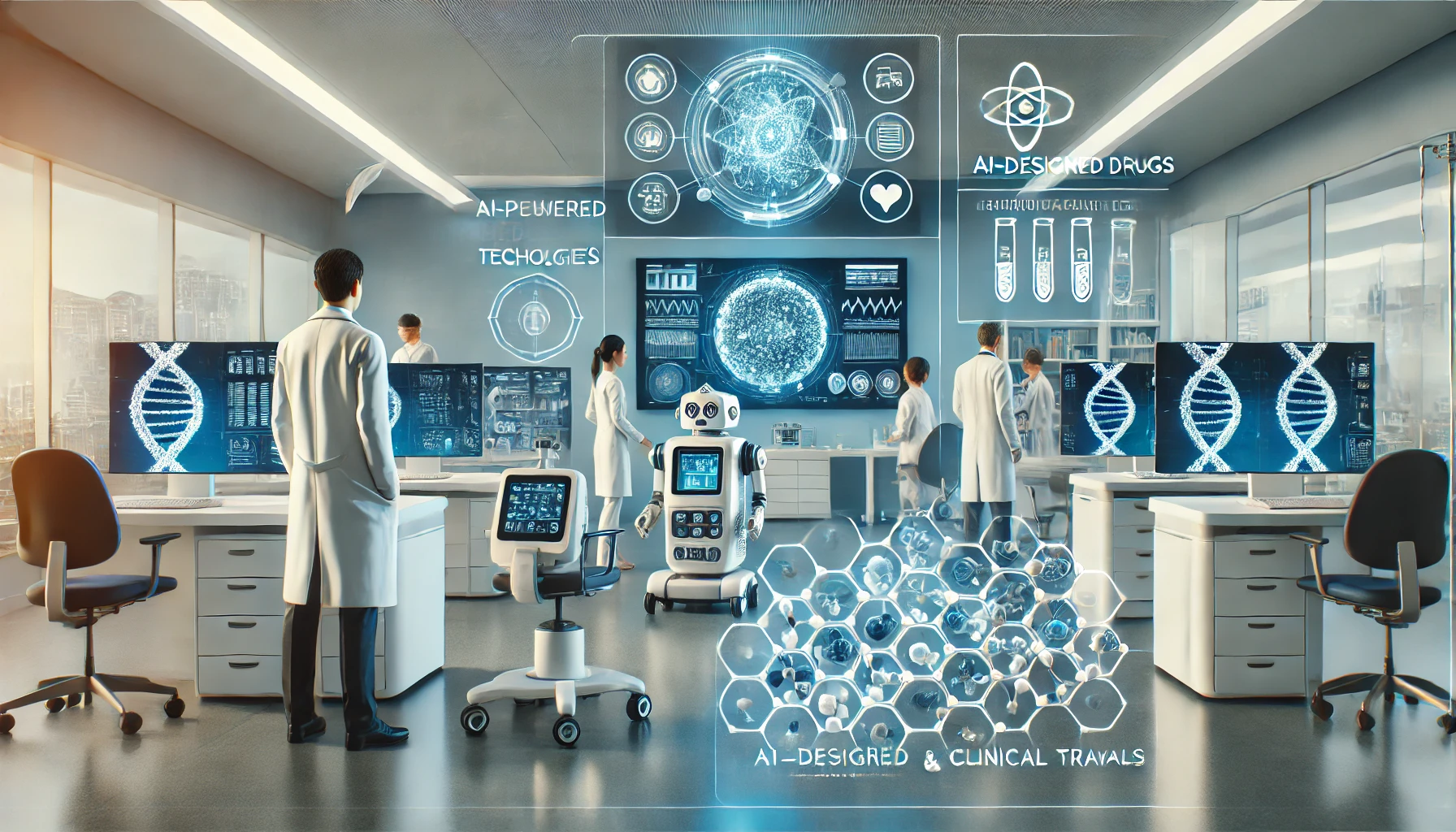The healthcare industry has entered a new era, driven by the rapid integration of artificial intelligence (AI) technologies. In 2023, we witnessed remarkable milestones, particularly with the emergence of AI-designed drugs entering clinical trials and a surge in FDA approvals for AI-enabled medical devices. As we move into 2024, the momentum in AI-powered health technologies shows no signs of slowing down, promising to reshape how we approach drug discovery, medical diagnostics, and patient care.
AI-Designed Drugs: A New Frontier in Medicine
AI’s role in healthcare has grown substantially in recent years, but perhaps the most groundbreaking development has been in drug discovery. Traditionally, drug development is a time-consuming and costly process, often taking years or even decades to bring a new treatment from the lab to the market. AI has the potential to dramatically reduce this timeline.
In 2023, several AI-designed drugs made significant progress by entering clinical trials. These drugs are developed using machine learning algorithms that analyze vast datasets of chemical compounds, biological interactions, and clinical data. AI can identify promising drug candidates faster than any human researcher, optimizing for effectiveness and minimizing potential side effects.
The entry of AI-designed drugs into clinical trials marks a pivotal moment for the pharmaceutical industry. By accelerating drug development, AI can lead to the discovery of treatments for complex diseases, such as cancer, Alzheimer’s, and autoimmune disorders, in a fraction of the time it would typically take. Moreover, AI enables personalized medicine by tailoring treatments to individual patient profiles, increasing the likelihood of success in clinical outcomes.
Surge in FDA Approvals for AI-Enabled Medical Devices
Alongside AI-designed drugs, 2023 also saw a significant uptick in FDA approvals for AI-enabled medical devices. These devices leverage AI algorithms to assist in diagnosing and treating patients with greater accuracy and efficiency. Whether it’s AI-powered imaging tools for detecting early signs of disease or wearable devices that continuously monitor vital signs, these innovations are transforming the way healthcare providers deliver care.
The surge in FDA approvals reflects the growing confidence in AI’s ability to improve patient outcomes. AI-enabled devices are designed to support doctors by analyzing complex medical data in real-time, offering insights that would be impossible to obtain manually. For example, AI is being used in radiology to detect anomalies in medical images more accurately than human radiologists, leading to earlier diagnoses and better treatment plans.
One notable area where AI-enabled devices have made a considerable impact is in surgical robotics. AI-driven robots can assist surgeons with precision, reducing the margin for error during complex procedures. As these technologies continue to evolve, we can expect even more sophisticated AI tools to enhance surgical outcomes and patient safety.
The Future of AI in Healthcare
Looking ahead to 2024, AI-powered health technologies are expected to continue their exponential growth. Several key trends will likely shape the future of AI in healthcare:
- Personalized Medicine: As AI algorithms become more advanced, we will see a shift towards truly personalized medicine, where treatments are tailored to an individual’s genetic makeup, lifestyle, and specific health conditions. This approach promises more effective treatments with fewer side effects.
- AI in Diagnostics: AI is poised to play an even larger role in diagnostics, especially in early detection of diseases like cancer, cardiovascular diseases, and neurological disorders. AI-driven diagnostic tools will allow for earlier intervention, potentially saving lives and reducing healthcare costs.
- AI-Powered Telemedicine: The integration of AI with telemedicine platforms will continue to grow, allowing healthcare providers to offer remote consultations with the aid of AI-driven diagnostic tools. This will enable more accurate remote diagnoses and reduce the need for in-person visits.
- AI and Drug Repurposing: Beyond drug discovery, AI is also being used to identify new uses for existing drugs. This process, known as drug repurposing, can provide new treatments for diseases without the need for lengthy development processes, offering faster and more cost-effective solutions for unmet medical needs.
- Regulatory and Ethical Considerations: As AI becomes more integrated into healthcare, there will be an increasing focus on regulatory frameworks to ensure patient safety and data privacy. Regulatory bodies like the FDA will need to adapt to the rapid pace of AI innovation, while ethical considerations around AI decision-making in healthcare will be a central topic of discussion.
Challenges and Opportunities
While the advancements in AI-powered health technologies are exciting, they also present new challenges. Data privacy and security are paramount in the healthcare industry, and with AI systems handling vast amounts of sensitive patient data, ensuring robust safeguards will be crucial. Additionally, the rapid pace of innovation may outstrip the ability of regulatory bodies to keep up, creating a need for updated frameworks that can accommodate these new technologies.
Despite these challenges, the opportunities presented by AI in healthcare are enormous. AI has the potential to revolutionize patient care, reduce healthcare costs, and improve outcomes across the board. By automating routine tasks, assisting in diagnostics, and accelerating drug discovery, AI frees up healthcare professionals to focus on what they do best—providing compassionate care to patients.
AI is rapidly transforming healthcare, and 2023 was a landmark year for AI-designed drugs and AI-enabled medical devices. As we move into 2024, the integration of AI in healthcare will only accelerate, offering unprecedented opportunities to improve patient outcomes, reduce costs, and enhance the overall efficiency of the healthcare system. Whether through personalized medicine, advanced diagnostics, or AI-powered surgical tools, the future of healthcare is undoubtedly AI-driven. As the technology continues to evolve, we can expect even more exciting innovations that will shape the future of medicine for years to come.



